Digital Literacy Training in Rural Nepal

Digital Literacy Training in Rural Nepal
Congratulations to the 89 students who, on the 20 April 2013, were awarded Certificates for successfully completing a two week intensive Digital Literacy Training Course. 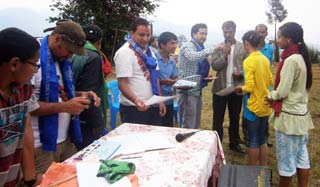 The course was conducted at the Astam Computer Centre as a joint partnership between the Logged On Foundation and Microsoft Innovation Centre, Nepal.
The course was conducted at the Astam Computer Centre as a joint partnership between the Logged On Foundation and Microsoft Innovation Centre, Nepal.
When we started preparing for the course, we expected around 10-20 students to enrol. But days before the start of classes, the Computer Centre Management Committee was overwhelmed with the number students wanting to attend the course. High school students, teachers and members of the community who attended came not only from the village of Astam, but together represented four different Village Development Committee (VDC) locations. Together with the 12 computers in the Computer Centre, 15 laptops were specially brought to Astam from Kathmandu. A generator was also hired to ensure constant power so classes could run all day starting at 7am.
The first group comprised of 30 School Leaving Certificate (SLC) level student and a second group of 37 students were at +2 level.
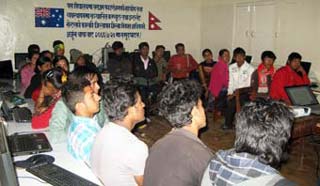 For those who are not familiar with the education system in Nepal, SLC is the final examination that is given at the end of the 10th grade of high school and is considered the ‘iron-gate’ for entry into higher levels of education. After passing the SLC, students have the option of studying two more years at the 11th and 12th grade to complete the Certificate of Higher Secondary Education (+2), or undertake a two year Proficiency Certificate in a chosen subject.
For those who are not familiar with the education system in Nepal, SLC is the final examination that is given at the end of the 10th grade of high school and is considered the ‘iron-gate’ for entry into higher levels of education. After passing the SLC, students have the option of studying two more years at the 11th and 12th grade to complete the Certificate of Higher Secondary Education (+2), or undertake a two year Proficiency Certificate in a chosen subject.
In April 2012, a group of SLC students on their holiday break approached the Computer Centre Committee in Astam requesting a computer course. “We did our best to provide some training that year and it motivated us to think about how we could provide a proper certified digital literacy training course on an annual basis,” says Mark Pinoli, President of Logged On.
Why is it important to provide such a course in rural Nepal?
The reality is that we live in a global technological culture in which literacy and numeracy are no longer enough. Without digital skills, the existing inequalities between rural and urban areas, and the developing and developed world will deepen.
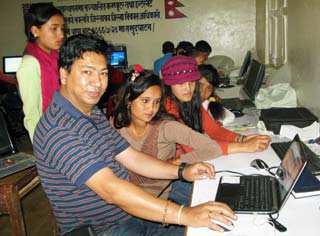 Logged On is not only providing access to information technology, we are working to see it used in beneficial ways, especially when it comes to strengthening the education of children and young people and creating opportunities for them.
Logged On is not only providing access to information technology, we are working to see it used in beneficial ways, especially when it comes to strengthening the education of children and young people and creating opportunities for them.
Proper digital literacy training for SLC and +2 students not only provides advantages for academic studies through online research and learning. Having good computer skills also gives them an advantage when seeking employment. The region where we are working, for example, is an important tourist hub and the uptake of computers and the demand for internet for local businesses is high.
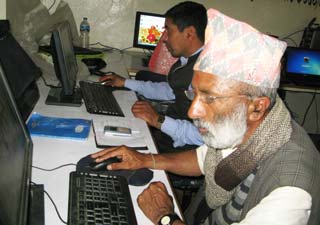 “I find myself often being asked to fix technical problems or provide IT advice to friends in Nepal whenever I am visiting”, says the President of Logged On. “I even remote desktop to the server in Astam from Australia to help troubleshoot problems. This is happening less frequently as time goes on and we will keep on training and building local capacity until even the most difficult issues with software and equipment can be resolved in the village without too much effort.”
“I find myself often being asked to fix technical problems or provide IT advice to friends in Nepal whenever I am visiting”, says the President of Logged On. “I even remote desktop to the server in Astam from Australia to help troubleshoot problems. This is happening less frequently as time goes on and we will keep on training and building local capacity until even the most difficult issues with software and equipment can be resolved in the village without too much effort.”
We were pleased to see that a third group was formed that comprised 20 teachers and two members of the Computer Centre Committee whose skills are being used to maintain computer facilities and the education programs that they are able to deliver.
In addition to the 89 students enrolled in the two week course, a women’s group with 9 participants was established at their request to be given a short course on using computers and the internet for communications (especially using Skype). One of Nepal’s major international exports is labour and many rural households depend on at least one member’s earnings from employment away from home. From our research, around 70% of households in Astam have a member of the family working overseas, particularly in the Middle East. Sometimes workers can face harsh employment conditions with abuse, manipulation, low pay and unsafe working environments. So after school hours, the Computer Centre has become a communication hub where families can stay in regular contact.
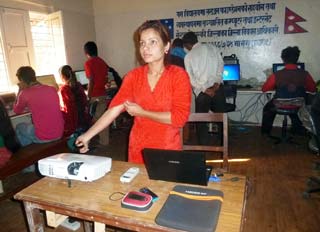 We would like to thank the Microsoft Innovation Centre (MIC) Nepal for providing an exceptional teacher, Ms Samjhana Bhandari, for the training in Astam. We would also like to thank Allen Tuladhar (MIC Director) for his support and the provision of training in Astam. Special thanks to Logged On’s management team Sudip Aryal, Raju Pariyar, Ves Raj Bastola and Bishow Adhikari who gave an enormous amount of effort to ensure the success of the program.
We would like to thank the Microsoft Innovation Centre (MIC) Nepal for providing an exceptional teacher, Ms Samjhana Bhandari, for the training in Astam. We would also like to thank Allen Tuladhar (MIC Director) for his support and the provision of training in Astam. Special thanks to Logged On’s management team Sudip Aryal, Raju Pariyar, Ves Raj Bastola and Bishow Adhikari who gave an enormous amount of effort to ensure the success of the program.
